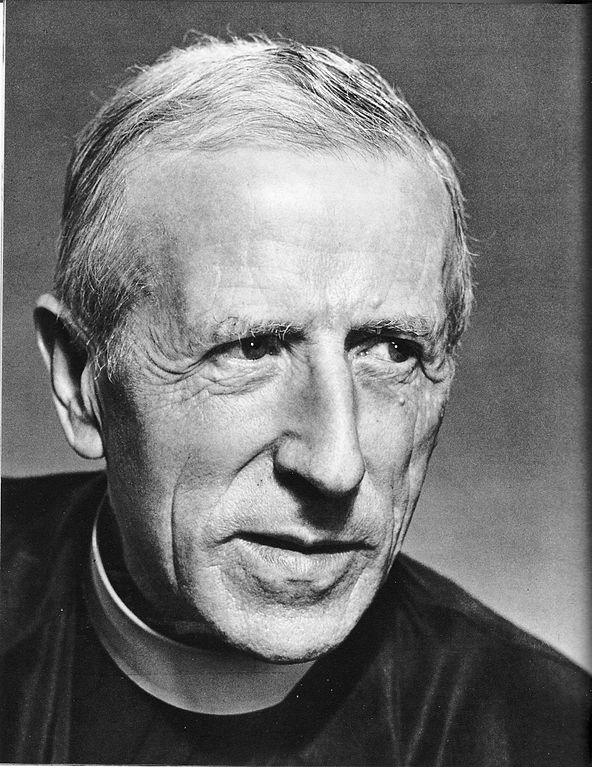LE writes: “There seems to be a resurgence of the life and philosophies of this man . What is going on? Have the people forgotten his history. I wanted to look him up in your list under new age but I couldn’t find him. Could you put out an exposé’ on him?”
Pierre Teilhard de Chardin was a Jesuit paleontologist who attempted to merge the theory of evolution with faith. The Church issued numerous warnings about his writings over the course of his long career.
Born on May 1, 1881 at the Château of Sarcenat at Orcines, France, his interest in the natural world began in his childhood and continued throughout his life. However, when he was ordained a priest in the Jesuit order in 1911, he decided to give up these interests in order to focus more entirely on his religious vocation. A trusted spiritual advisor directed otherwise and reassured him that his studies in the natural sciences could also give glory to God.
Just three years after his ordination, he was drafted into the French army where he served as a stretcher bearer during World War I, winning the Croix the Guerre and Chevalier de la Legion d’Honneur for his heroic service.
“In the midst of this slaughter and crippling of millions of men, Teilhard’s faith was shaken. But his insight into the evolving flow of history helped him to see, even in the midst of human tragedy, a sense of communion with the world and communion with God united in the crucified Christ,” writes Jim Campbell for IgnatiusSpirituality.com.
He went on to receive a doctorate in geology from the Sorbonne but his insights into the nature of evolution did not gain approval from the Church hierarchy. Some of these writings included: The Divine Milieu (1927), The Vision of the Past (1935), Building the Earth (1937), The Phenomena of Man (1940), and The Future of Man (1941).
According to the New World Encyclopedia, the problems with Teilhard’s views concerned his questioning of whether or not Christ’s mission ended with the crucifixion or is up to humankind to continue through the evolutionary process.
“In Teilhard’s view, the evolutionary process occurs naturally toward ultimate convergence of all creation with God. In this process, evil and sin occurred in the process of growth, seen as “growing pains” and not the major perversion of Original Sin. Thus, the role of Christ is not seen by Teilhard as primarily redemptive for our sin, but rather as opening the way to convergence between the physical and spiritual realms.”
It’s not hard to see why the Church had problems with his writings. In 1925, he was ordered by his Jesuit superiors to leave his teaching position in France and to sign a statement withdrawing his controversial statements about original sin. He did so, and then left for China where he spent 23 years working in the field under the most primitive conditions.
“Teilhard’s efforts to receive ecclesiastical approval for the publication of The Phenomena of Man failed, and he was also denied the opportunity to teach in France,” Campbell writes. “With his health failing, Teilhard traveled to South America and South Africa tracing further discoveries of the evolutionary journey. He finally settled at St. Ignatius Parish in New York City where he died peacefully Easter Sunday, April 10, 1955.”
Citations and bans of de Chardin’s works continued even after his death, culminating in the posthumous warning issued by the Sacred Congregation of the Holy Office in 1962 which said that some of his words “abound in such ambiguities and indeed even serious errors, as to offend Catholic doctrine.” The same warning was re-issued in 1981.
De Chardin’s philosophies have been refuted by many of the best minds in the Church, including the imminent Catholic philosopher Dietrich von Hildebrand who referred to him a false prophet in this stinging expose of his works.
The fact that de Chardin continues to be quoted in publications is not surprising as there has always been dissent in the Church from those who refuse to obey the Magisterium.
To the best of my knowledge, there has been no retraction of the Church’s stance against many of the writings of Pierre Teilhard de Chardin.










